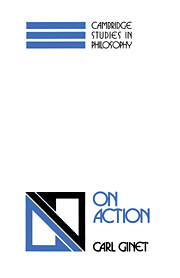Summary
The philosophy of action deals with the notion of action that applies only to beings who have wills. (The words action and act are, of course, applied to other sorts of entities – we speak of the action of the acid on the metal and of how the pistons act to move the drive shaft – but what action and act mean in such applications is not a concern here.) We take ourselves, people, to be the paradigms of enwilled agents. That we are beings who act is a fundamental fact about us. It is as important as the fact that we are cognizers, beings who know and believe. (These two aspects are, of course, thoroughly interconnected: The knowledge and beliefs we have and those we want influence our actions, and our actions influence the beliefs we come to have.) Yet, though philosophers in the Western tradition from Socrates on have had much to say about action, it is only in the last three decades or so that the theory of action has come to be thought of as a distinct branch of philosophy, on a par with the theory of knowledge. This may be because there was a tendency to think of action as a subconcern of philosophizing about rationality and morality. And indeed, very important questions about action arise there, such questions as what it is to choose one's actions rationally and what makes it the case that a person is morally responsible for an action.
- Type
- Chapter
- Information
- On Action , pp. ix - xiiPublisher: Cambridge University PressPrint publication year: 1990



